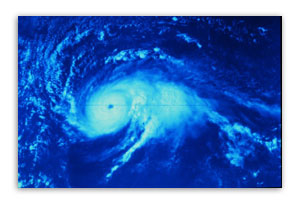Q&A with James Franklin, branch chief, and Dennis Feltgen, public affairs officer, of the National Hurricane Center
Hurricanes are a threat for many Americans, particularly those who live along the nation’s coasts. The best time to prepare for hurricanes is before they occur, according to experts with the National Hurricane Center, which is part of the National Oceanic and Atmospheric Administration's National Weather Service.
What are key things people must do to get ready for hurricanes?
 Franklin: The first thing is to understand what the hurricane hazards are. The three primary ones, of course, are the strong winds, storm surge and inland flooding. Those are the three Hurricane Anitabasic hazards and people need to know what those hazards can do. And then know which of those hazards that you’re particularly vulnerable to where you live.
Franklin: The first thing is to understand what the hurricane hazards are. The three primary ones, of course, are the strong winds, storm surge and inland flooding. Those are the three Hurricane Anitabasic hazards and people need to know what those hazards can do. And then know which of those hazards that you’re particularly vulnerable to where you live.
The second thing really is to become familiar with (the) National Weather Service’s hurricane products, both the ones issued by the National Hurricane Center and the local products that come out of the National Weather Service forecast offices. They have different functions. We look at the big picture about where the storm will go, how strong it’s going to be, how big it’s going to be — and then the local offices provide more detail on impacts at the local level.
It’s also really important that you understand the difference between a hurricane watch and a hurricane warning. Those are calls to action with different meanings.
On an individual level, develop a plan for your family. Every family should have a hurricane plan. If you know you’re vulnerable to a storm surge and know that you might have to evacuate, know ahead of time where you’re going to go. Don’t wait until the hurricane warning comes up to figure out where you’re going to go if you have to evacuate. That’s something that you really need to plan ahead of time. Have materials on hand to protect your home, regardless of whether you’re going to stay or go. And, of course, the hurricane supplies: the food, water, medicines for several days.
We have an excellent website, www.hurriances.gove/prepare/, that has all kinds of information on those details. But it all starts with knowing what the hazards are and knowing what your vulnerabilities are.
Which Americans are most at risk from hurricanes?
Franklin: Basically, anyone along the coast from Texas to Maine. Every state has historically been struck by a tropical cyclone, if you look back in the records. And it’s not a purely coastal threat, either. We saw in the case of (2012’s) Hurricane Sandy that it produced tropical storm wind gusts all the way to Wisconsin. Now, that’s certainly not going to happen all the time, but these storms do move inland, and some of the inland threats in terms of flooding particularly can affect people well away from the coast. So the entire East Coast, and inland as well. Everybody there needs to know what’s going on with hurricanes once we get into the season.
How can families and communities communicate with each other during a hurricane?
Franklin: Well, the first thing you want to do is stay off the landline phones, that’s for sure. The biggest problem that you’re going to have during a hurricane is power failure. So people don’t realize that when they have those walk-around telephones in their house and the power goes out, those phones are useless. So it’s always good to have an old-fashioned, plug-in, non-electrical phone in the house. I’ve got one in my house at my wife’s beckoning, and she’s absolutely right about that.
And another thing is that we’re very, very dependent on cellphones. But the other thing about that is when the power goes out, how are you going to recharge your cellphones? You have to make sure that you have a battery-powered backup cellphone charger. And the problem that a lot of people have with cellphones is that phone calls do use significant bandwidth. But when you send a text message, it uses much smaller bandwidth. So text messaging may be the way to go with communicating with each other.
Can social media be used to prepare for a hurricane?
Feltgen: Well, social media is just another tool in the toolbox. It’s a great way, as we’ve already discussed, to communicate with each other, but again, it’s not going to be a stand-alone thing.
The Internet itself has some very great websites that have preparedness tips that you need to be reading and using before the hurricane season. The two best that I know of are, of course, the National Hurricanes website — that’s www.hurricanes.gov — and www.hurricanes.gov/prepare. And also FEMA’s website, which is www.ready.gov. Both of those have incredibly useful tips to get ready for the season.
And I keep saying getting ready for the season before the season starts. If the hurricane warning flags are flying, and you haven’t even got a hurricane plan in place, you’re already behind the eight-ball. You’ve got to make some very important decisions very quickly. And if you haven’t got that plan in place, odds are that you aren’t going to make the right decisions under duress. So you’ve got to be doing that now while you’ve got some time and the calmness to do it.
Photo: Hurricane Anita approaches the coast of Mexico south of Brownsville, Texas, in 1977. Courtesy National Oceanic and Atmospheric Administration/Department of Commerce